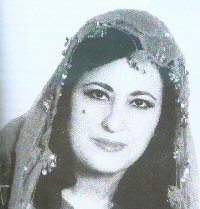
Ayse San was one of the greatest Kurdish dengbêj. She borned in 1938 in Amid and died in 1996 in Izmir. I translate here the paper that The Kurdish Institute of Paris made about her when she died. And for listening some songs, it is at this link.
“The most famous of Kurdish singers in 1960-1970s, Ayse San, died on December 18th in Izmir, after a long illness. She borned in Diyarbakir in a dengbêj’s family. She was still very young when people noticed the exceptionnal quality of her voice. In a country whre singing publicly in Kurdish was forbidden, her dream to be a singer will face many obstacles. Radios, places of concert, music-production companies did not take the risks to face prison, and then refused to make records with her. Then in 1963, the owner of a tea-garden accepted that she sang each evening front of his çayxane, where people spent their summer evening by drinking samovars of tea. The success came very fastly. In one evening, the garden-tea won more money than ordinary in one month.
A Jewish man of Istanbul, Albert Mesulum, who was fond of Ayse San’s voice, accepted to take the risk to make a record with 2 Kurdish songs and 2 Turkish’s also for not beeing accused of “separatism”. It was the first Kurdish record in the history the Turkish republic and it had immediately a huge popular success. It had been followed by many others, and all these records were confiscated and banned during the military Coup of March 1971. Forbidden in her own country Ayse San stayed 3 years in Germany. Her records were constantly played at Radio Erevan and Radio Bagdad for the happiness of all her fans.
In 1979 she was invited in Bagdad to sing in programm of Kurdish music. Then she gave concerts in the main cities of Southern Kurdistan, with other Kurdish singers like Mihamed Arif Cizrawî and Isa Berwarî. These concerts had huge success and nowadays Kurds are still fond of her records made at this time.
When she came back for familial motives in Turkey she was one more time condemned to keep silent, in a Turkey ruled by military regime.
She was the first public Kurdish singer in Turkey and thanks to her extraordinary talent and courage she was also the first she-singer to have a large public in all Kurdistan and in the Kurdish diaspora from Eurpa and Caucasus.”
